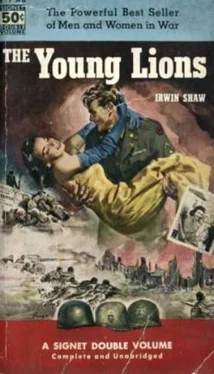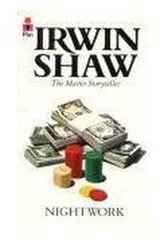Irwin Shaw - The Young Lions
Здесь есть возможность читать онлайн «Irwin Shaw - The Young Lions» весь текст электронной книги совершенно бесплатно (целиком полную версию без сокращений). В некоторых случаях можно слушать аудио, скачать через торрент в формате fb2 и присутствует краткое содержание. Жанр: Классическая проза, на английском языке. Описание произведения, (предисловие) а так же отзывы посетителей доступны на портале библиотеки ЛибКат.
- Название:The Young Lions
- Автор:
- Жанр:
- Год:неизвестен
- ISBN:нет данных
- Рейтинг книги:4 / 5. Голосов: 1
-
Избранное:Добавить в избранное
- Отзывы:
-
Ваша оценка:
- 80
- 1
- 2
- 3
- 4
- 5
The Young Lions: краткое содержание, описание и аннотация
Предлагаем к чтению аннотацию, описание, краткое содержание или предисловие (зависит от того, что написал сам автор книги «The Young Lions»). Если вы не нашли необходимую информацию о книге — напишите в комментариях, мы постараемся отыскать её.
The Young Lions — читать онлайн бесплатно полную книгу (весь текст) целиком
Ниже представлен текст книги, разбитый по страницам. Система сохранения места последней прочитанной страницы, позволяет с удобством читать онлайн бесплатно книгу «The Young Lions», без необходимости каждый раз заново искать на чём Вы остановились. Поставьте закладку, и сможете в любой момент перейти на страницу, на которой закончили чтение.
Интервал:
Закладка:
Christian did not sleep. He lay uncomfortably, with growing rigidity, listening to the breathing of the woman beside him, staring at the moon and mirror-flecked ceiling. Outside, there was the noise of the hobnailed patrol again, increasing and receding on the silent pavement. It did not sound remote any more, or pleasant, or meaningless.
Refugee, Christian remembered, and remembered the low, mocking laugh that accompanied it. He turned his head a little and looked at Francoise. Even as she slept, he imagined seeing a superior, victorious smile at the corner of the long, passionate mouth. Christian Diestl, the non-conquering refugee, finally given admission to the Parisienne's bed. The French, he remembered, they will beat us all yet. And, what's worse, they know it.
Suddenly it was intolerable to think of Brandt snoring softly in the next room, intolerable for himself to remain in bed next to the handsome woman who had used him so comfortably and mercilessly. He slid noiselessly on to the floor and walked barefooted and naked over to the window. He stared out over the roofs of the sleeping city, the chimneys shining under the moon, the pale streets winding away narrowly with their memories of other centuries, the river shining under its bridges in the distance. He could hear the patrol from the window, faint and brave across the still dark air, and he got a glimpse of it as it crossed an intersection. Five men walking deliberately and cautiously down the night-time streets of the enemy, vulnerable, stolid, pathetic, friends…
Swiftly and soundlessly, Christian dressed himself. Francoise stirred once, threw her arm out languidly towards the other side of the bed, but she did not awake. Her arm looked white and snake-like stretched into the warm emptiness beside her.
Christian stole through the door and closed it softly behind him.
Fifteen minutes later he was standing before the desk of a Colonel in the SS. In the sleeping city, the SS officers did not sleep. The rooms were brilliantly lighted, men came and went in an endless bustle, there was the clatter of typewriters and teletype machines, and it had the unreal, hectic air of a factory going full blast during an overtime night-shift.
The Colonel behind the desk was wide awake. He was short and he wore heavy horn-rimmed glasses, but there was no air of the clerk about him. He had a thin gash for a mouth, and his magnified pale eyes were coldly probing behind their glasses. He held himself like a weapon always in readiness to strike.
"Very good, Sergeant," the Colonel was saying. "You will go with Lieutenant von Schlain and point out the house and identify the deserter and the women who are hiding him."
"Yes, Sir," said Christian.
"You are right in supposing that your organization no longer exists as a military unit," the Colonel said dispassionately. "It was overrun and destroyed five days ago. You have displayed considerable courage and ingenuity in saving yourself…" Christian could not tell whether the Colonel was being ironic or not, and he felt a twinge of uneasiness. The Colonel, he realized, made a technique out of making other people uneasy, but there was always the chance this was something special. "I shall have orders made out for you," the Colonel went on, his eyes glinting behind the thick lenses, "to be returned to Germany for a short leave, and assigned to a new unit there. In a very short time, Sergeant," the Colonel said, without expression in his voice, "we will need men like you on the soil of the Fatherland. That is all. Heil Hitler."
Christian saluted and went out of the room with Lieutenant von Schlain, who also wore glasses.
In the small car with Lieutenant von Schlain, which preceded the open truck with the soldiers, Christian asked, "What will happen to him?"
"Oh," said von Schlain, yawning, taking off his glasses, "we'll shoot him tomorrow. We shoot a dozen deserters a day, and now, with the retreat, business will be better than ever." He put his glasses back and peered out. "Is this the street?"
"This is the street," Christian said. "Stop here."
The small car stopped in front of the well-remembered door. The truck clanged to a halt behind it and the soldiers jumped out.
"No need for you to go up with us," von Schlain said. "Might make it unpleasant. Just tell me which floor and which door and I'll handle it in no time."
"Top floor," said Christian, "the first door to the right of the stairway."
"Good," said von Schlain. He had a lordly, disdainful way of speaking, as though he felt that the Army was making poor use of his great talents, and he wished the world to understand that immediately. He gestured languidly to the four soldiers who had come in the truck, and went up the steps and rang the bell, very loudly.
Standing on the kerb, leaning against the car in which he had come from SS Headquarters, Christian could hear the bell wailing mournfully away in the concierge's quarters deep in the sleeping fastnesses of the house. Von Schlain never took his finger off the bell, and the ringing persisted in a hollow, nervous crescendo. Christian fit a cigarette and pulled at it hard. They'll hear it upstairs, he thought. That von Schlain is an idiot.
Finally there was a clanking at the door and Christian heard the irritable, sleepy voice of the concierge. Von Schlain barked at her in rapid French and the door swung open. Von Schlain and the four soldiers went in and the door closed behind them.
Christian paced slowly up and down alongside the car, puffing on the cigarette. Dawn was beginning to break and a pearly light, mingled with secret blues and silvery lavenders, was drifting across the streets and buildings of Paris. It was very beautiful and Christian hated it. Soon, that day perhaps, he would leave Paris, and probably never see it again in his whole life, and he was glad. Leave it to the French, to the supple, cheatingly, everlastingly victorious French… He was well rid of it. It looked like a fair meadow and it turned out to be slippery swamp-land. It seemed full of beauty and promise and it turned out to be a sordid trap, well-baited and fatal to a man's dignity and honour. Deceptively soft, it blunted all weapons that attacked it. Deceptively gay, it lured its conquerors into a bottomless melancholy.' Long ago, the Medical Corps had been right. The cynical men of science had supplied the Army with the only proper equipment for the conquest of Paris… three tubes of Salvarsan…
The door was flung open and Brandt, with a civilian coat thrown over pyjamas, came out between two soldiers. Just behind him came Francoise and Simone, in robes and slippers. Simone was sobbing, in a childish, strangled, tearing convulsion, but Francoise looked out at the soldiers with calm derision.
Christian stared at Brandt, who looked painfully back at him in the half-light. There was no expression on Brandt's face, snatched out of its deep, secure sleep, only dull exhaustion. Christian hated the lined, over-delicate, compromising, losing face. Why, he thought with surprise, he doesn't even look like a German!
"That's the man," Christian said to von Schlain, "and those're the two women."
The soldiers pushed Brandt up into the truck, and rather gently lifted Simone, now lost in a tangled wet marsh of tears. Helplessly, Simone, once she was in the truck, stretched out her hand towards Brandt. Christian despised Brandt for the soft, tragic way in which without shame, in front of the comrades he would have deserted, he put out his hand to take Simone's and carry it up to his cheek.
Francoise refused to allow the soldiers to help her climb into the truck. She stared for a moment with harsh intensity at Christian, then shook her head gently in a gesture of numb bewilderment, and climbed heavily up by herself.
There, Christian thought, watching her, there, you see, it is not all over yet. Even now, there are still some victories to be won…
Читать дальшеИнтервал:
Закладка:
Похожие книги на «The Young Lions»
Представляем Вашему вниманию похожие книги на «The Young Lions» списком для выбора. Мы отобрали схожую по названию и смыслу литературу в надежде предоставить читателям больше вариантов отыскать новые, интересные, ещё непрочитанные произведения.
Обсуждение, отзывы о книге «The Young Lions» и просто собственные мнения читателей. Оставьте ваши комментарии, напишите, что Вы думаете о произведении, его смысле или главных героях. Укажите что конкретно понравилось, а что нет, и почему Вы так считаете.











